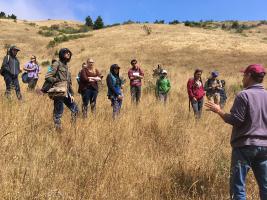Program Curriculum and Course Requirements
The Environment & Community Program is a 2-year, interdisciplinary Master's Degree program.
Program Curriculum
The Master's Degree program is a two year program including the following coursework and requirements:
Required Seminars (15 units)
- EC 601: E&C Cohort Field & Immersion Experience (Fall semester)
- EC/NAS 610: Environment and Community Methods: Decolonizing Methodologies (Fall)
- EC 620: Climate Resilience Topic
- EC 630: Social Change & Advocacy Topic
- EC 640: Critical Ecology Topic
Required Colloquium (3 units)
- EC 615 Graduate Colloquium (1 unit, taken each of first 3 semesters)
Thesis/Project (690) or Comprehensive Exam (691) Units (3 units)
- Taken graduating semester
Thesis/Project Field Research OR Additional Seminar/Elective Course (3-6 units)
- For those students opting for a thesis/project, units will be taken in final fall and/or spring semester. For those students opting for a Master’s Exam, they are required to take one additional seminar or elective course.
Elective Courses (1 must be graduate level - electives can be E&C seminars) (6 units)
- Electives are fulfilled by courses in other departments and require no additional E&C courses.
- Research or general elective courses, from recommended course list or with graduate coordinator’s approval.






